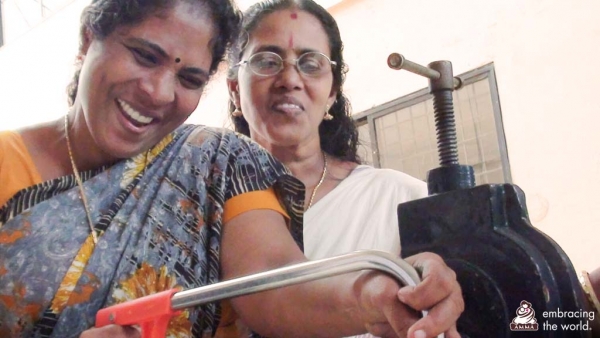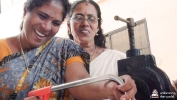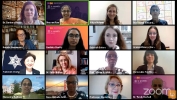The virtual event took place from August 19-20 and invited all concerned to participate, including academics, researchers, students, and any organization or stakeholder. The result was hundreds of participants from more than 46 countries, 54 presentations and interventions, and a signed declaration by all invited UNESCO Chairs.
“When I embarked on my filmmaking career, I did so with incredible women role models and mentors and I greatly value the collective sisterhood that exists within my community. It doesn’t just happen though,” said Ms. Ava DuVernay, the Guest of Honor. She is the Co-Chair, Prada Diversity and Inclusion Advisory Council.
“We all come together and we support each other, we check in on each other, show up for each other, we celebrate and toast each other’s success. And we rally together during times of struggle. And let’s be honest, we all struggle. But the important thing to know is knowing your worth, your value, knowing deep down, what you’re capable of.”
Over the course of the summit, participants discussed the most recent trends, concerns and solutions adopted to address practical challenges and improve women's resilience. Contributions spanned from systems thinking methods and models to computational social sciences to technological innovations.
Ms. Jamila Seftaoui was a keynote speaker. She is the Director, Division for Gender Equality, Cabinet of the Director-General, UNESCO, Paris. She said, “My vision for the next biennium builds on past progress and takes into consideration the huge still untapped potential of UNESCO to change people’s lives, in particular women’s and girls’ lives for good, for the better.
“I intend to consolidate ongoing support to UNESCO programs, and help improve and steer the orientation of UNESCO towards more lasting transformative gender equality impacts.”
The participants also broke into smaller group sessions to focus on their specific fields, including Science & Technology; Education & Skill Development; Society, Culture & Legal Rights; Health & Nutrition; Safety & Security; Environment & Sustainability; Finance & Economics; and Communication & Leadership.
The UNESCO Chairs came together to make a joint declaration which states:
We, the UNESCO Chairs and Networks on Gender Equality, declare that we will:
Make our best and sincere efforts to promote gender equality as a cross-cutting agenda in the Sustainable Development Goals all over the world, so that no woman or girl is left behind;
Come together and join hands, so as to explore areas of collaborations together, among ourselves, but also with all academics, governments, NGOs, and institutions promoting gender equality and the empowerment of women and girls in a variety of areas;
Meet on an annual basis, either physically or virtually, and participate in global discussions on emerging challenges, areas, and new approaches to questions and issues related to gender equality and the situation of women and girls in the world, including on other platforms and events organized by the United Nations at the global, regional and national levels;
Establish a framework and a mechanism to organize future summits in a way that serves the interests of all current and future UNESCO gender-related Chairs and Networks.
“We believe in the power of UNESCO chairs to expand UNESCO’s mandate and to help realize the 2030 Agenda because we are convinced that a sustainable and peaceful world will never be so without gender equality,” said Mr. Eric Falt, Director and UNESCO Representative to Bhutan, India, Maldives, and Sri Lanka.
The invited UNESCO gender-related chairs included:
UNESCO Chair on Women, Sciences and Technology - Professor Gloria Bonder, La Facultad Latinoamericana de Ciencias Sociales (FLACSO), Sede Académica Argentina
UNESCO Chair on Water, Women and Development - Isabel Roseli Ribeiro and Vera Lúcia de Miranda Guarda, Université fédérale d'Ouro Preto-UFOP, Ouro Preto, Minas Gerais, Brazil
UNESCO Chair in Cultural Diversity, Gender and Border Territories - Prof Damião Duque de Farias, Universidade Federal da Grande Dourados, Brazil
UNESCO Chair on Women, Gender, Sciences, Society and Sustainable Development - Prof Karifa Bayo, Université de Ouagadougou, Burkina Faso
UNESCO Chair in Media and Gender - Dr. Liu Chang, Communication University of China
UNESCO Chair for the Promotion of Gender Equality - Antonio Roveda Hoyos, Universidad del Rosario, Columbia
UNESCO Chair on Water, Women and Decision-making - Prof Euphrasie Hortense Yao Kouassi, Université de Cocody, CIRES, Côte d'Ivoire
UNESCO Chair on Gender Equality and Women's Empowerment - Dr. Mary Koutselini, University of Cyprus, Cyprus
UNESCO Chair on Water, Women and Governance - Francisco T. Rodriguez, Instituto Global de Altos Estudios en Ciencias Sociales (IGLOBAL), Dominican Republic
UNESCO Chair on the Empowerment of Women through Science and Technology - Prof Boshra Mossaad Awad, Ain Shams University, Egypt
UNESCO Chair on the Women and Science - Prof Elyès Jouini, Université Paris Dauphine-PSL, France
UNESCO Chair on Women, Peace and Security: Building Capacity and Resilience through Education and Research - Dr. Fotini Bellou, University of Macedonia, Greece
UNESCO Chair on Gender Equality and Women's Rights in the Multicultural Society - Dr. Barbara Pozzo, University of Insubria, Italy
UNESCO Chair on Gender and Vulnerability in Disaster Risk Reduction Support - Prof Alexander Ronni, Kobe University, Japan
UNESCO Chair in Women and Community Health - Prof Bahemuka Judith, University of Nairobi, Sociology department, Kenya
UNESCO Chair on Youth Leadership in Science, Health, Gender and Education - Prof Marleen Temmerman, Aga Khan University, Kenya
UNESCO Chair in Communication Technology for Women - Dr. Yunkeum Chang, Sookmyung Women’s University, Republic of Korea
UNESCO Chair in Gender, Leadership and Equity - Dra. Elia Marum Espinosa, The University of Guadalajara, Mexico
UNESCO Chair on Water, Women and Decision-making - Dr. Asma El Kasmi, Université Al Akhawayn d'Ifrane, Morocco
UNESCO Chair on Women and Rights - Prof Khalid Berjaoui, Université Mohammed V, Morocco
UNESCO Chair on Gender and Digital Technologies - Namibia University of Science and Technology, Namibia
UNESCO Chair on Gender Equality in Higher Education Institutions - Dr. Patricia Ruiz Bravo and Aranxa Pizarro, The Pontifical Catholic University of Peru, Peru
UNESCO Chair in Women, Society and Development - Prof. Renata Siemienska, University of Warsaw, Poland
UNESCO Chair in Policies on Gender and Equal Rights between Women and Men - Prof. Virginia Maquieira d'Angelo, Universidad Autónoma de Madrid, Spain
UNESCO Chair on Women, Development and Cultures - Dr. Sandra Ezquerra, Université de Vic/Université de Barcelone, Spain
UNESCO Chair on Gender Equality Policies in Science, Technology and Innovation - Prof. Ines Sánchez de Madariaga, Universidad Politécnica de Madrid, Spain
UNESCO Chair on Appropriate Technologies for Human Development - Prof. María Teresa Fernández de la Vega, Universidad Complutense de Madrid, Spain
UNESCO Chair in Women, Science and Technology - Abdelgadir Hassan, Sudan University of Science and Technology, Sudan
UNESCO Chair in Women, Science and Reasoned Water Management in West Africa - Prof. Isabel Glitho, Université de Lomé, Togo
UNESCO Chair on Improvement in Gender Equality and the Empowerment of Women - Prof. Hulya Ugur Tanriove, Giresun University, Turkey
UNESCO Chair on Gender Equality and Sustainable Development - Dr. Oder Bertil Emrah, Koç University, Turkey
UNESCO Chair on Gender Equality and Culture - Prof. Hülya Şimga, Maltepe University, Turkey
UNESCO Chair in Gender Research - Dr. Sylvia Walby, Lancaster University, United Kingdom of Great Britain and Northern Ireland
UNESCO Chair on Gender, Wellbeing and a Culture of Peace - Dr. Araceli Alonso, University of Wisconsin-Madison, USA
UNESCO Chair on Sustainable Development, Early Childhood, Inclusive Education and Gender - Georgetown University, Washington DC, USA
UNESCO Chair in Women's Empowerment and Gender Equality - Dr. Bhavani Rao, CWEGE, Amrita Vishwa Vidyapeetham, India
UNESCO Chair on Women and Science for Development (New Chair as of June 2021) - Dr. Rose Michelle Smith, Institut des Sciences, des Technologies et des Etudes Avancées d'Haiti (ISTEAH), Haiti
Photo 1: All of UNESCO’s 36 gender-related chairs and networks united to address the challenges women and girls face in terms of their futures, especially in a post-pandemic world.
Photo 2: Hundreds of people from more than 46 countries took part in the W36 Global Summit.






